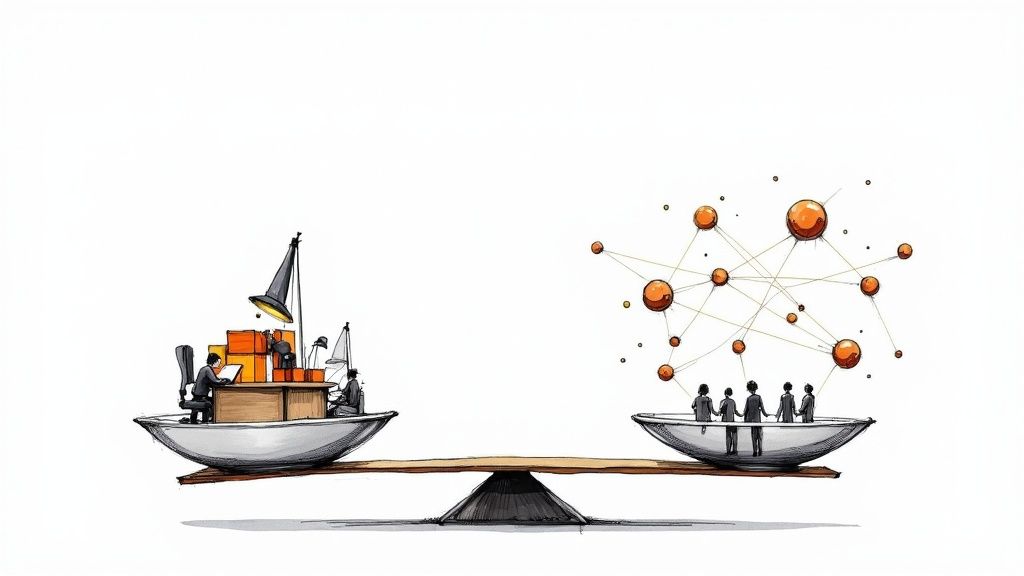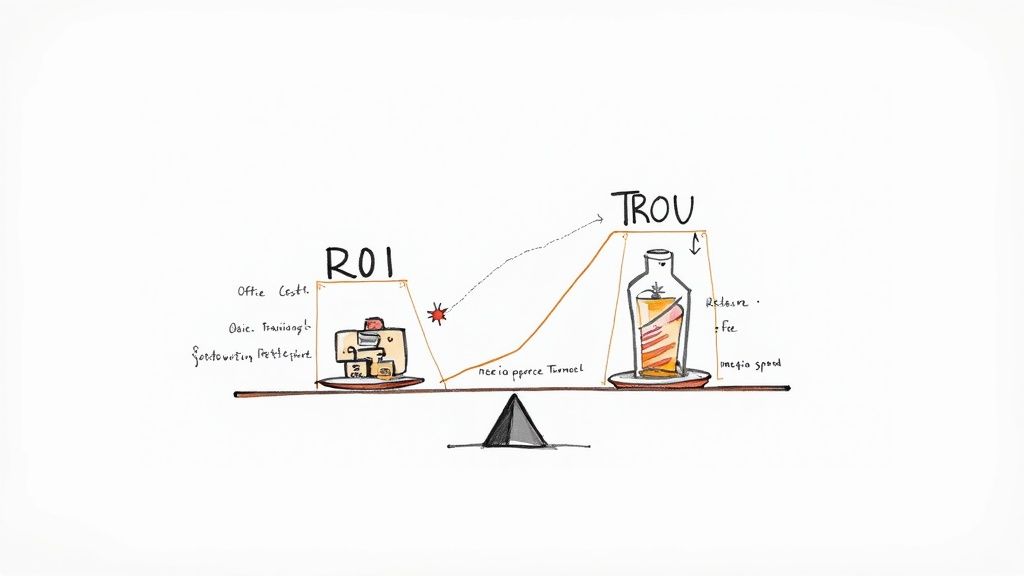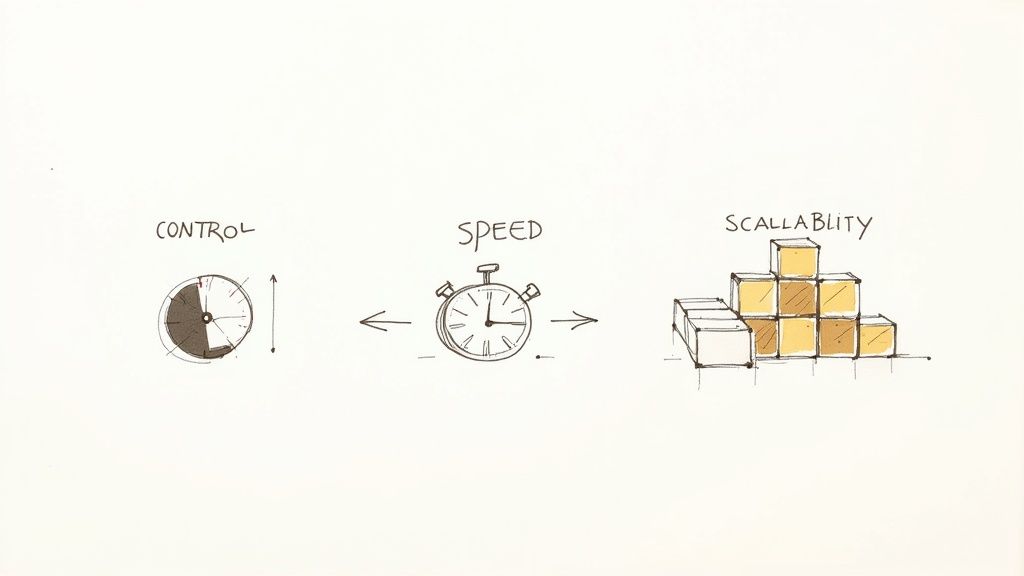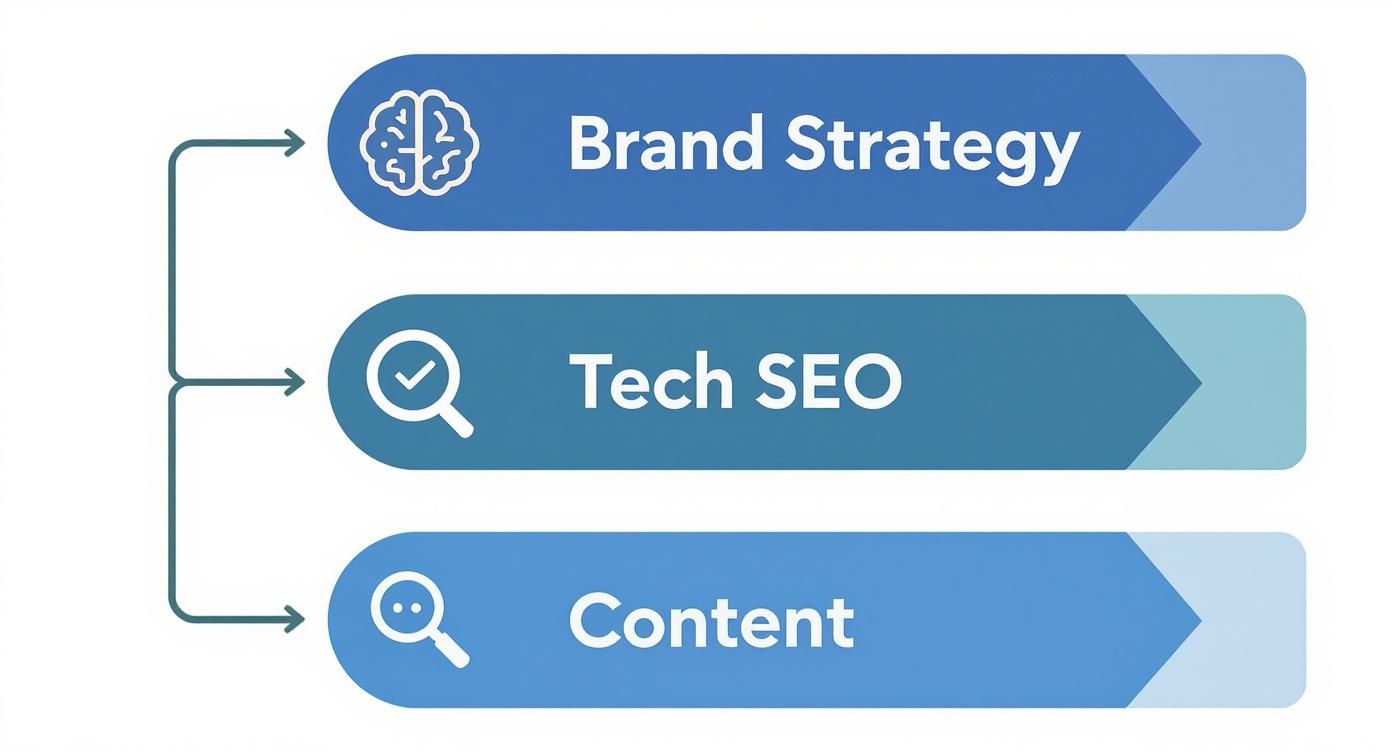
Unlock Growth: Choosing the Right Demand Generation Company for Your Business
Choosing the right demand generation company is key to business growth. Learn how to select a partner for sustained success.

The classic debate of in-house marketing vs. agency boils down to a simple trade-off. Do you want a team that lives and breathes your brand every day, or do you need instant access to a diverse squad of specialists? Your answer will depend entirely on where your business is right now and where you want it to go.
Figuring out your marketing structure is a massive decision. It impacts your budget, but it also dictates how fast you can move and react to market changes. This isn't just about getting tasks done; it's a strategic choice about how you plan to grow. For many, this decision leads to considering options like digital marketing outsourcing, which brings its own benefits.
Bringing marketing in-house isn't a new idea. The trend picked up steam after the 2007-2009 financial crisis, when companies focused on cutting costs and gaining more control. In fact, a 2008 survey found that 42% of marketers had already built some form of in-house agency, all chasing better transparency and efficiency.
To make this choice clearer, let's break down the fundamental differences. This table gives a high-level look at the trade-offs you'll be making. Think about what matters most to your company at this moment.
There's no single "right" answer—just the right answer for you. As you think it over, if you find yourself leaning toward an agency, our guide on how to choose a marketing agency can help you vet potential partners.
Let's talk money. The "in-house vs. agency" debate often gets stuck on comparing an employee's salary to an agency's retainer, but that's a rookie mistake. The real cost is always hiding in the details.

When you hire a marketer, their salary is just the tip of the iceberg. The true cost of an in-house employee is much more than what you see on their offer letter.
Agencies, on the other hand, bundle all of this into cleaner pricing. You'll typically see monthly retainers for ongoing work or project-based fees. That retainer might seem large, but remember what it includes—access to a full team and often, a suite of expensive enterprise-level software you'd otherwise have to pay for yourself.
Thinking about tools is a big part of this. For instance, digging into different social media management tool alternatives can show you just how much you could save or spend, depending on your goals.
Ultimately, this all boils down to Return on Investment (ROI). An in-house team gives you unmatched focus on your brand. An agency brings instant, specialized expertise and the ability to scale. The right call depends on forecasting the full cost of both options and seeing which one supports your growth goals. If you need a hand with the numbers, our guide on how to measure marketing ROI breaks down how to do it.
One of the biggest questions in the in-house vs. agency debate comes down to talent. Who knows your business better, and who has the sharper skills?
An in-house team lives and breathes your brand every single day. That deep understanding of your product, customers, and company culture is something an outside partner can never fully replicate. It's the source of truly authentic marketing.
But there's a flip side. This intense focus can create blind spots. Marketing is a fast-moving field, and it’s a huge ask for a small team to master everything from the latest Google algorithm update to the nuances of TikTok advertising.
This is where an agency shines. When you hire an agency, you're not just getting one or two marketers; you're getting a whole team of specialists on-demand. You instantly have access to experts in paid search, content strategy, data analytics, and creative direction.
It's a common challenge. In fact, 64% of companies believe agencies offer better access to specialized skills, according to recent HubSpot data. The same report found that agencies with advanced tools can often deliver results 15–20% faster than internal teams. You can see the full marketing report here.
As you can see, companies aren't just looking for extra help—they're seeking deep expertise in complex areas like SEO and content creation. It confirms that agencies are often brought in to fill critical skill gaps.
Partnering with a data-driven marketing agency is more than just outsourcing tasks. It’s an investment in a battle-tested system of expertise and technology, giving you access to senior-level talent without the hefty price tag and commitment of building a large internal department.

The in-house marketing vs. agency debate really boils down to a classic business dilemma: Do you want more control, or more speed and scalability? The right answer depends entirely on what your business needs to win.
Having an in-house team gives you the ultimate say. Your people are living your company culture every day, which means your brand voice and daily priorities are always perfectly in sync. That kind of direct oversight is fantastic for keeping everything consistent.
But that level of control often means you're less agile. Need to ramp up for a huge product launch? You've got to go through the hiring process. Hit a slow quarter and need to pull back? That could mean painful restructuring. It’s not a nimble setup.
This is where an agency flips the script. They offer a "plug-and-play" team of specialists, ready to go from day one. This dramatically slashes the time it takes to get new campaigns off the ground. When a new opportunity pops up, a good agency can jump on it immediately, while an in-house team might still be trying to hire the right person.
That kind of flexibility is a massive advantage, especially in a fast-changing industry. Agencies are built to handle sudden pivots and can shift resources without getting bogged down by internal HR.
Think about it: let's say you suddenly need to launch a sophisticated pay-per-click campaign to counter a competitor. An agency could have it designed and running in days. Your in-house team would have to find and hire a PPC specialist—a process that can take months—or pull someone off another project who might lack the deep expertise needed.
This ability to scale up or down on demand is what makes agencies a powerful tool for growth. You can explore new marketing channels, react to competitors, or double down on a winning campaign without the long-term overhead of new salaries.
The in-house vs. agency debate doesn't have to be a black-and-white decision. In fact, some of the smartest companies realize the best path forward is a mix of both. This hybrid approach lets you blend the deep brand knowledge of your internal team with the specialized skills of an outside agency.
This isn't about paying for the same job twice; it's about smart delegation. A hybrid model means you keep your brand's voice and strategy inside your own four walls. Things like overall brand direction, daily social media conversations, and customer communication are perfect for an in-house team.
At the same time, you can offload the highly technical or resource-heavy tasks. Think complex technical SEO audits, managing massive pay-per-click (PPC) campaigns, or producing a high-end video series. For these, an agency’s specialized tools and seasoned experience can make all the difference.
Making a hybrid model work comes down to clear roles. Your in-house people are the strategic heart, the keepers of the brand vision. The agency then acts as a specialized unit, brought in to execute specific missions with precision.
It’s a major trend. A recent industry report showed that 91% of brands have moved at least some of their advertising functions back in-house. But this isn't about firing agencies; it’s about changing the relationship. Brands now use agencies for high-impact projects, like how Spotify partners with top-tier creative firms for its massive annual 'Wrapped' campaign. You can learn more about this shift toward blending in-house and agency talent in recent studies.
In a hybrid model, an agency isn't just another vendor—they're a strategic partner. Your in-house lead decides the "what" and the "why," while the agency brings the expert "how." It creates a marketing machine that's both powerful and efficient.
This setup gives you the best of both worlds. You get the passionate ownership of an internal team paired with the broad expertise and scalability an agency provides. It's a flexible, cost-effective way to build a top-tier marketing operation.
Deciding what to keep and what to outsource can be tricky. Here’s a quick breakdown of where different marketing functions typically fit best within a hybrid structure.
The right mix depends entirely on your team's current skills, your budget, and your growth goals. The key is to see both sides not as competitors, but as two parts of a single, high-performance engine.
Alright, let's get down to it. Deciding between in-house marketing and hiring an agency isn't about a simple pro/con list; it's about taking an honest look at your specific situation. These questions will help you cut through the noise and make a choice that fits your business.
First, your budget. Can you afford a full-time hire? Remember, the “fully loaded” cost of an employee is often 25-35% higher than their salary once you factor in benefits, taxes, and tools. If your cash flow is unpredictable, an agency's fixed monthly fee can be a safer bet.
On the other hand, if you're growing fast and can map out your needs for the next few years, building an internal team might deliver a stronger ROI down the road. It all starts with what your finances can realistically support.
Take inventory of who you already have. Is there someone on your team who can manage an agency and translate your business goals into marketing speak? Without that internal champion, even the best agency relationship can go sideways.
If you're starting with zero marketing know-how, an agency gives you an entire team of specialists overnight—no recruiting headaches or training delays. But if you have a great marketing generalist on board, you can bring in an agency to handle the highly technical stuff they can't, like advanced PPC or technical SEO.
This is where a hybrid approach often makes the most sense. You keep the core brand strategy in-house and let specialists handle the execution.

The big takeaway? It's not an all-or-nothing game. The smartest companies blend internal vision with external expertise.
Making the right call here can be the difference between stagnating and scaling. If you're leaning toward an agency partner that’s obsessed with results, BrandBooster.ai builds marketing programs that deliver real business outcomes. We’re so confident, we guarantee tangible returns in 60 days, or you don’t pay. Find out how we can boost your brand at https://www.brandbooster.ai.